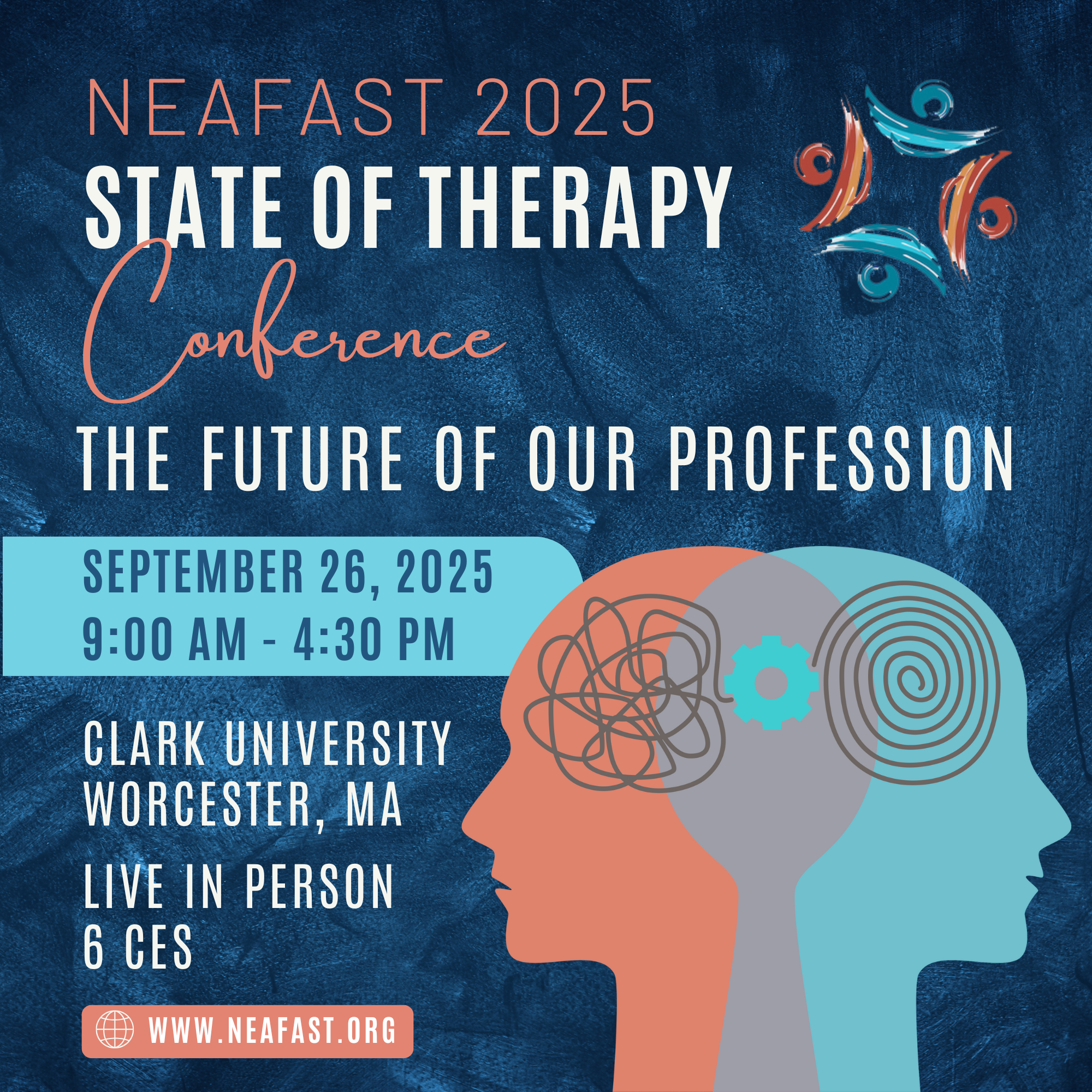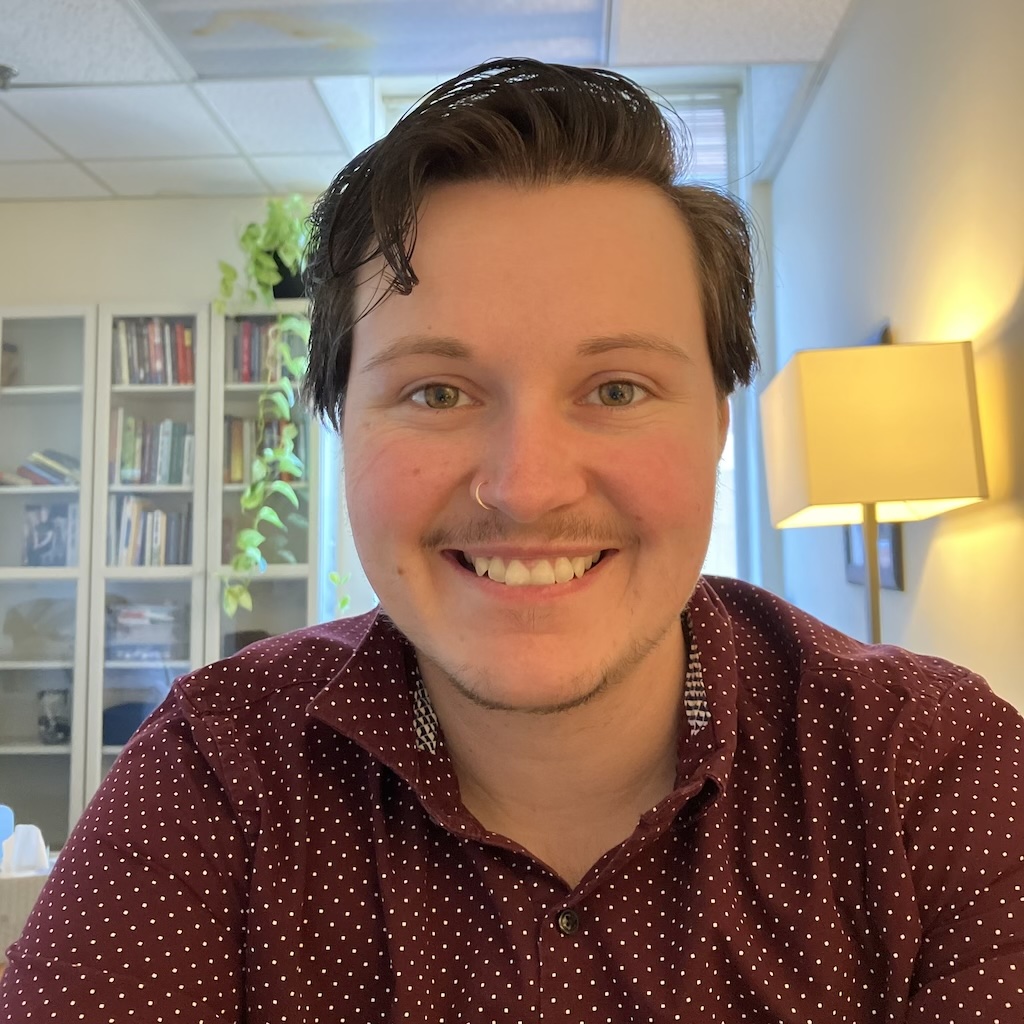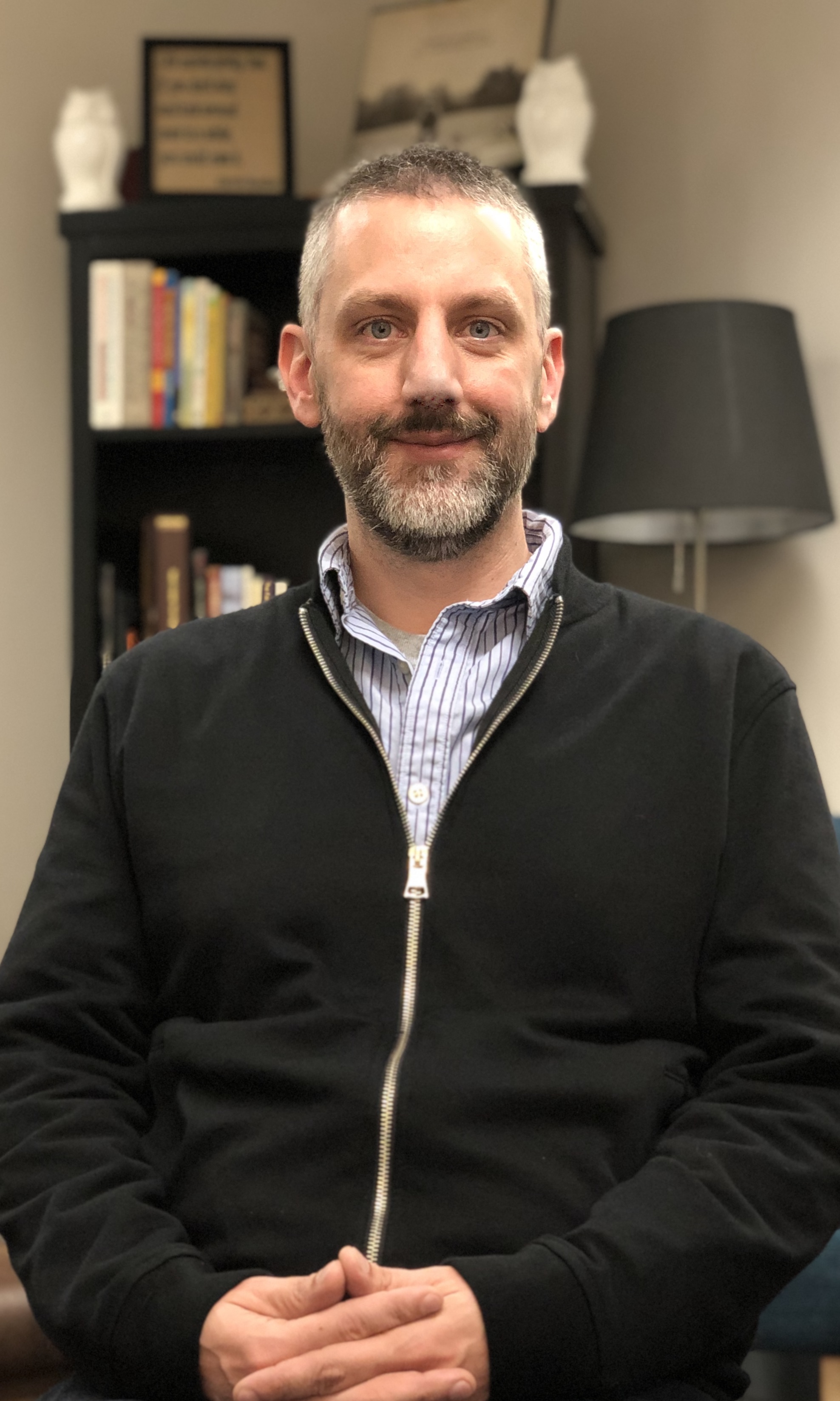
NEAFAST Annual Conference 2025
State of Therapy: The Future of Our Profession
DATE: September 26, 2025; 9:00am - 4:30 pm ET
6 CEs | Live In-Person
Clark University, Worcester MA
In five short years psychotherapy has shifted from a primarily face to face practice to teletherapy as the new normal. While the rapid advances in Artificial Intelligence offer the possibility of new resources for clients and clinicians, they also create new, darker concerns. These dramatic changes take place against the backdrop of social unrest and political division. State and Federal laws governing our practice create confusion and contradiction. This conference will create dialogue and seek to inform attendees of the emerging issues that impact the current and future state of our profession.
OVERALL SCHEDULE:
- 8:45 - 9 am - Arrival/Sign In
- 9 - 9:30 am - Welcome / Introduction / Ice Breakers
- 9:30 -10:45 am - Session #1 (options below)
- 10:45 - 11 am - BREAK
- 11 am - 12:15 pm Session #2 (options below)
- 12:15 - 1:15 pm - LUNCH (Catered/Included w/ registration)
- 1:15 - 2:30 pm - Session #3 (options below)
- 2:30 - 2:45 pm - BREAK
- 2:45 - 4 pm - Session #4 (options below)
- 4 - 4:30 pm - Closing Remarks
WORKSHOP OPTIONS:
Each workshop will follow this format:
- TED Talk-like presentation that introduces the topic
- One provocative question that will be discussed in small groups
- A large group discussion of themes that stood out from the small groups
- Additional questions and answers
Session #1 (9:30 - 10:45 am)
How AI impacts Relationships: Ethics, Embodiment, Connection, and Sexuality
The use of AI and virtual reality is on the rise and while many eschew its use, many more are utilizing it on a daily basis. In the therapy room and the therapist office AI is taking a life of its own. From clinical notes to clients who have are exploring relationships and sexuality in digital spaces, technology is having an undeniable impact on the self and on relationships. This presentation seeks to explore the multifaceted aspects of the use of technology on human connection and sexuality, both the solo and the relational.
 Jordon Anderson, LICSW, CST (they/them) is a neurospicy, visibly trans, chronic-illness impacted, white-idenitifed individual. They work as a relational therapist and certified sex therapist. They are a published poet and lover of the often overlooked world around us. They are a lifelong student of relationships and practice anti-ism work. Jordon Anderson, LICSW, CST (they/them) is a neurospicy, visibly trans, chronic-illness impacted, white-idenitifed individual. They work as a relational therapist and certified sex therapist. They are a published poet and lover of the often overlooked world around us. They are a lifelong student of relationships and practice anti-ism work.
Understanding Neuroception and Building Therapist Resilience in a Telehealth World
The delivery of mental healthcare has rapidly shifted from in-person sessions to telehealth since the COVID-19 pandemic in 2020. Telehealth offers advantages such as greater flexibility and increased access to care; however, it also presents significant challenges for mental health providers. Clinicians who provide couples and family therapy must pay extra attention to non-verbal cues that are harder to perceive on a screen and to the varied dynamics among multiple family members, given the systemic nature of their work. The heightened focus required to attend to non-verbal signals from numerous individuals can significantly affect the clinician's ability to regulate their nervous system.This presentation will examine the impact of telehealth on therapists, particularly in terms of self-care issues for those offering couples and family therapy. We will draw on recent findings that have emerged since the onset of the pandemic. Our goal is to explore the challenges and benefits of telehealth for couples and family therapists through the lens of "Neuroception" as outlined in Polyvagal Theory. Finally, we will discuss essential self-care needs and recommendations based on the principles of Polyvagal Theory.
 Grace Chen, PhD, LMFT, Grace Chen, PhD, LMFT, (she/her) is an EMDRIA-certified EMDR Therapist and Approved Consultant with a background in counseling and couple and family therapy. She started her career in Taiwan, working with survivors of childhood sexual abuse and victims of partner violence. Recognizing the importance of the family system and cultural influences, she pursued further training in Couple and Family Therapy in the US. She earned her PhD from Michigan State University, specializing in Couples and Family Therapy. Grace has extensive experience in community mental health settings and established her private practice in Andover in 2015, where she focuses on EMDR therapy to treat clients with Complex PTSD and Relational Trauma.
Parallel Grieving: Balancing Client and Therapist Grief in an Era of Political Crisis
This experiential workshop will explore the politically significant dimensions of client and therapist grief within our current sociopolitical landscape. Amid the increased targeting of vulnerable communities, psychotherapists face unique challenges that extend beyond conventional understandings of countertransference, burnout, or compassion fatigue. Drawing on Judith Butler's (2004) framework of "grievable lives" and social constructionist approaches to systemic therapy, this workshop will examine how dominant discourses determine whose suffering matters and how clients’ and therapists’ own grief can become disenfranchised within professional contexts.Through conversation and reflection, participants will explore the intersections of personal, professional, and political grief. We will examine how systems of oppression shape therapeutic encounters and institutions, while also investigating how collective mourning can function as resistance to these dominant narratives. This workshop offers a space for attendees to confront their own positionality, build community through shared vulnerability, and develop practices that honor grief as information for justice-oriented therapeutic work.
 Skeetz Edinger, LMFT (he/they) is a private practice owner and approved supervisor in Salem, MA. He earned his MS in Psychology with a concentration in Family, Couple, and Individual Psychotherapy from Our Lady of The Lake University’s Houston Campus in 2018. He currently serves on the NEAFAST Board of directors and Licensure and Legislation Committee. With a theoretical grounding in Narrative and Collaborative-Dialogic Practice, he is passionate about advocating for and co-constructing spaces where practitioners can thrive through supportive policy, accessible practice environments, and generative professional discourse. Skeetz Edinger, LMFT (he/they) is a private practice owner and approved supervisor in Salem, MA. He earned his MS in Psychology with a concentration in Family, Couple, and Individual Psychotherapy from Our Lady of The Lake University’s Houston Campus in 2018. He currently serves on the NEAFAST Board of directors and Licensure and Legislation Committee. With a theoretical grounding in Narrative and Collaborative-Dialogic Practice, he is passionate about advocating for and co-constructing spaces where practitioners can thrive through supportive policy, accessible practice environments, and generative professional discourse.  Iyabo Akinadewo - (she/her) As a pre-licensed professional, Iyabo Akinadewo integrates couple and family therapy, somatic interventions, and expressive arts to promote personal growth, self-awareness, and emotional well-being. She offers an empathetic and creative approach to working with individuals, couples, and families, incorporating individual, relational, and broader social perspectives to address complex issues. Her methods are tailored to each client’s unique needs, considering their relationships, life experiences, and perspectives. With experience working with neurodivergent families, veterans, LGBTQ+ individuals, and diverse communities, Iyabo offers a collaborative approach that supports healing, connection, and strength. Iyabo Akinadewo - (she/her) As a pre-licensed professional, Iyabo Akinadewo integrates couple and family therapy, somatic interventions, and expressive arts to promote personal growth, self-awareness, and emotional well-being. She offers an empathetic and creative approach to working with individuals, couples, and families, incorporating individual, relational, and broader social perspectives to address complex issues. Her methods are tailored to each client’s unique needs, considering their relationships, life experiences, and perspectives. With experience working with neurodivergent families, veterans, LGBTQ+ individuals, and diverse communities, Iyabo offers a collaborative approach that supports healing, connection, and strength.
Session #2 (11 am - 12:15 pm)
Federal Laws in the Therapy Room: What Therapists Need to Know
The current federal administration has strongly signaled what its goals are and their vision for the United States, and therapists are sitting with individuals, couples, and families are all being impacted. This workshop will feature an overview of therapists need to know, and how they can have their voices heard. From changes to HIPAA (that actually predate this administration) to the plans to change and disrupt Medicaid and insurances offered through the Affordable Care Act to the Make America Health Again (MAHA) initiatives, 2025 has been a dizzying tornado of federal actions. Additionally, ongoing executive orders have introduced new challenges for mental health professionals. Some directives have placed restrictions on how therapists serve certain client populations, affecting access to care and ethical obligations. By the end of this workshop, therapists will have a deeper understanding of federal laws shaping their practice, the boundaries of confidentiality, and actionable steps to influence policy decisions.
 Katrin (Kate) Sanford (she/her) is a Licensed Marriage and Family Therapist (LMFT) and an AAMFT Approved Supervisor. She also holds certifications in Healthcare Compliance (CHC) and Healthcare Privacy Compliance (CHPC). Additionally, Kate is a privacy and compliance professional with experience in healthcare and mental health, having worked in multiple organizations leading their Privacy and Compliance programs. She also supervises individuals seeking their master’s in family therapy, seeking licensure, or looking to become AAMFT Approved Supervisors themselves. Lastly, Kate has served as an adjunct professor, teaching graduate courses in Marriage and Family Therapy and Professional Ethics. Katrin (Kate) Sanford (she/her) is a Licensed Marriage and Family Therapist (LMFT) and an AAMFT Approved Supervisor. She also holds certifications in Healthcare Compliance (CHC) and Healthcare Privacy Compliance (CHPC). Additionally, Kate is a privacy and compliance professional with experience in healthcare and mental health, having worked in multiple organizations leading their Privacy and Compliance programs. She also supervises individuals seeking their master’s in family therapy, seeking licensure, or looking to become AAMFT Approved Supervisors themselves. Lastly, Kate has served as an adjunct professor, teaching graduate courses in Marriage and Family Therapy and Professional Ethics.
Partnership in Practice: Tools and Tech for Guiding Couples Towards Sustainable Labor Equity
Many couples struggle with the unequal distribution of emotional and domestic labor. This workshop offers practical strategies to help clients build more equitable and sustainable partnerships in lasting and agile ways. The session also includes a brief overview of current FamTech tools—apps and platforms that aim to support household and emotional workload management—along with guidance on how to integrate these tools thoughtfully into the therapeutic process.
 Lucinda Gibbons, MMFT (she/her) is a Marriage and Family Therapist with advanced training in Perinatal Mental Health from Postpartum Support International. She is the founder of Lake House Collective and lead trainer for The Fair Play Method, supporting practitioners worldwide. Lucinda specializes in men’s mental health, perinatal care for all family members, LGBTQ+ families, and workplace inclusion. Her warm, practical approach fosters collaborative learning and personal growth. She helps clients rebalance domestic labor, strengthen communication, and make values-aligned choices. Based north of Boston, Lucinda offers virtual sessions globally and in-person services in South Hamilton, MA. Lucinda Gibbons, MMFT (she/her) is a Marriage and Family Therapist with advanced training in Perinatal Mental Health from Postpartum Support International. She is the founder of Lake House Collective and lead trainer for The Fair Play Method, supporting practitioners worldwide. Lucinda specializes in men’s mental health, perinatal care for all family members, LGBTQ+ families, and workplace inclusion. Her warm, practical approach fosters collaborative learning and personal growth. She helps clients rebalance domestic labor, strengthen communication, and make values-aligned choices. Based north of Boston, Lucinda offers virtual sessions globally and in-person services in South Hamilton, MA.
Session #3 (1:15 - 2:30 pm)
Digital Dialogue: Helping Couples Integrate AI with Relational Growth
As mental health stigma continues to decline, more individuals and couples are turning to digital platforms—TikTok, Instagram, and increasingly, AI—for relational guidance and emotional insight. With the growing accessibility of tools like ChatGPT, couples are experimenting with artificial intelligence to improve communication, navigate conflict, and deepen self-understanding.Therapists now find themselves at a critical crossroads: whether to resist these technological shifts in favor of traditional therapeutic boundaries, or to thoughtfully integrate them into clinical practice. This workshop invites clinicians to take on the enduring role of guide and ethical steward—helping couples harness emerging AI tools in ways that enhance, rather than replace, the depth and efficacy of therapeutic work. Using research, case examples, and interactive demonstrations, this session will explore how AI can influence relational dynamics, emotional regulation, and intimacy. Participants will learn how to assess the therapeutic value and risks of AI use in relationships, and will leave with practical strategies for supporting clients in using AI tools responsibly—while preserving the core values of emotional attunement, mutual empathy, and human connection.
 Brittney Slater, LMFT, (she/her) is a licensed marriage and family therapist with a specialization in sex therapy and over 15 years of experience helping couples build stronger, more fulfilling relationships. In addition to her private practice, Brittney is the creator of a groundbreaking series of sex therapy and couples counseling seminars, designed to provide in-depth, high-quality guidance from the comfort of home. Combining cutting-edge neuroscientific research with traditional cognitive behavioral and emotion focused therapy, Brittney empowers couples to deepen their connection, enhance intimacy, and navigate relationship challenges with confidence and understanding. Brittney Slater, LMFT, (she/her) is a licensed marriage and family therapist with a specialization in sex therapy and over 15 years of experience helping couples build stronger, more fulfilling relationships. In addition to her private practice, Brittney is the creator of a groundbreaking series of sex therapy and couples counseling seminars, designed to provide in-depth, high-quality guidance from the comfort of home. Combining cutting-edge neuroscientific research with traditional cognitive behavioral and emotion focused therapy, Brittney empowers couples to deepen their connection, enhance intimacy, and navigate relationship challenges with confidence and understanding.
How Therapists are Shaping the Future of Mental Health Care through Advocacy
Did you know that Marriage and Family Therapists are essentially trained to be Mental Health Advocates? Given our training in making systemic change and experience with family systems themselves, we are uniquely positioned to recommend systemic change on a broader societal scale through policy, social justice and regulatory reform. This workshop will teach attendees that MFTs are not only qualified to be Mental Health Advocates but ethically have a responsibility to act as advocates for the mental health community.
 Jaime Rodriguez (she/her) has been a LMFT since 2011. Jaime is a graduate of Rutgers University and went on to receive her Masters of Marriage and Family Therapy from Southern CT State University in 2008. She is currently working in a private practice setting and her work in her practice is with families at all stages in the life cycle. Additionally, Jaime has been the CTAMFT Advocacy Chair since 2021. As Advocacy Chair, Jaime manages all legislative and advocacy needs of CTAMFT, works in partnership with the CTAMFT lobbyist, collaborates with other state mental health associations, advocacy coalitions and state departments. Jaime Rodriguez (she/her) has been a LMFT since 2011. Jaime is a graduate of Rutgers University and went on to receive her Masters of Marriage and Family Therapy from Southern CT State University in 2008. She is currently working in a private practice setting and her work in her practice is with families at all stages in the life cycle. Additionally, Jaime has been the CTAMFT Advocacy Chair since 2021. As Advocacy Chair, Jaime manages all legislative and advocacy needs of CTAMFT, works in partnership with the CTAMFT lobbyist, collaborates with other state mental health associations, advocacy coalitions and state departments.
When the Manosphere Invades Therapy: Working with Today’s Lost Boys and Men
The statistics are overwhelming and the causes are not fully understood - or are hotly debated. But one thing for sure is that boys and men are struggling. Therapists today - for those males who are self-aware enough to go to therapy or the ones dragged there kicking and screaming by parents and partners - are struggling to break through ice walls of defenses, misunderstandings of stoic philosophy and evolutionary biology, and an online culture weaponizing and profiting off a crisis of masculinity. This workshop will examine how to break through to men and young men adrift in a sea of toxic messaging without labeling, blaming and shaming.
 Michael Lynch, LMFT (he/him) has been treating individuals, couples, families and groups for over 15 years in California and Massachusetts, first with the non-profit Center for Individual and Family Counseling in North Hollywood and private practice internship with Dr. Stephen Johnson, founder of Men’s Center Los Angeles. Mike later moved to his hometown of Lowell, Massachusetts to provide outreach therapy through South Bay Mental Health. In 2019 after overcoming the obstacles of getting licensed in Massachusetts he opened his private practice, Men’s Center New England in Burlington, focusing on the treatment averse male population. Michael is also the President of NEAFAST. Michael Lynch, LMFT (he/him) has been treating individuals, couples, families and groups for over 15 years in California and Massachusetts, first with the non-profit Center for Individual and Family Counseling in North Hollywood and private practice internship with Dr. Stephen Johnson, founder of Men’s Center Los Angeles. Mike later moved to his hometown of Lowell, Massachusetts to provide outreach therapy through South Bay Mental Health. In 2019 after overcoming the obstacles of getting licensed in Massachusetts he opened his private practice, Men’s Center New England in Burlington, focusing on the treatment averse male population. Michael is also the President of NEAFAST.
Session #4 (2:45 - 4 pm)
For and Against Technology: Getting Back to Human in a Technocratic, Post-Covid, Politically Oppressive Ecology
The pandemic plummeted therapists into telehealth. We learned to work from behind screens. After Covid, many of us remained in that world, which is both convenient and problematic at the same time. Is it better? How do we evaluate the differences between in person and computer based sessions? Has therapist health improved physiologically and psychologically? What is the contemporary culture of psychotherapy in the United States now? Can our past struggles making family therapy relevant help us now?
 Stephen Duclos (he/him) has been working as a family therapist, mental health counselor, and rehabilitation counselor since 1972. He currently holds licenses/national certifications in Sex Therapy (CST), Couples and Family Therapy (LMFT), Mental Health Counseling (LMHC), and Rehabilitation Counseling (CRC). Stephen is an Approved Supervisor with the American Association for Marriage and Family Therapists (AAMFT), and AASECT. He is also a member of the American Family Therapy Academy. In 2012, he received the Patricia Schiller Prize (AASECT) for his work on Fathers, Adolescent Daughters, and Sexuality. Stephen Duclos (he/him) has been working as a family therapist, mental health counselor, and rehabilitation counselor since 1972. He currently holds licenses/national certifications in Sex Therapy (CST), Couples and Family Therapy (LMFT), Mental Health Counseling (LMHC), and Rehabilitation Counseling (CRC). Stephen is an Approved Supervisor with the American Association for Marriage and Family Therapists (AAMFT), and AASECT. He is also a member of the American Family Therapy Academy. In 2012, he received the Patricia Schiller Prize (AASECT) for his work on Fathers, Adolescent Daughters, and Sexuality.
AAMFT Panel: License Portability, Medicare and Trends in the MFT Profession
 Representatives from AAMFT will be joining us to present on licensure portability, Medicare updates, and other strategic efforts. They will share data from the 2025 MFT Industry Workforce Study highlighting trends and shifts in the profession. Attendants will have the opportunity to ask questions regarding AAMFT and the work they are doing to advance the profession. Representatives from AAMFT will be joining us to present on licensure portability, Medicare updates, and other strategic efforts. They will share data from the 2025 MFT Industry Workforce Study highlighting trends and shifts in the profession. Attendants will have the opportunity to ask questions regarding AAMFT and the work they are doing to advance the profession.
Registration Fees:
The annual State of Therapy Conference includes the opportunity to learn from, network, and collaborate with other family and systemic therapists. The following fees will give you 6 CEs, lunch, and the opportunity to network with the brightest, most talented relational therapists in New England:
Early Bird (Before 8/22) - $170 for NEAFAST members, $190 for Non-members
Regular Registration (8/23 through 9/25) - $180 for NEAFAST members, $200 for Non-members
Students: $40 (Through the Emily Mitchell Scholarship Fund, which includes one year of NEAFAST membership)
Become an NEAFAST Member!
POLICY DISCLOSURES & PARTICIPANT EXPECTATIONS
This activity is certified by the New England Association for Family and Systemic Therapy (NEAFAST) on behalf of the Massachusetts Board of Registration of Allied Mental Health & Human Services Professions for LMFT professional continuing education.
This activity is approved by the Massachusetts Mental Health Counselors Association, Inc. on behalf of the Massachusetts Board of Registration of Allied Mental Health & Human Services Professions for LMHC professional continuing education.
This activity is approved by NASW-MA for social work continuing education credits.
Please contact us at [email protected] for the status of CE accreditations.
It is the participant’s responsibility to check with their individual state boards to verify CE requirements for their state.
This program is being offered independent of any commercial support or conflict of interest. Clinicians with any level of experience are welcome to participate.
Attendance Policy: All participants seeking continuing education credit must attend the entire program. NEAFAST may, in cases of medical emergencies or other extenuating circumstances, offer partial credit if 80% of the overall credit hours were completed. Please speak to the instructor/facilitator as soon as possible about this if necessary.
Cancellation Policy: There will be no refunds. It is the participant's responsibility to plan to attend the entirety of the conference.
|


 Jordon Anderson, LICSW, CST
Jordon Anderson, LICSW, CST Grace Chen, PhD, LMFT, (she/her) is an EMDRIA-certified EMDR Therapist and Approved Consultant with a background in counseling and couple and family therapy. She started her career in Taiwan, working with survivors of childhood sexual abuse and victims of partner violence. Recognizing the importance of the family system and cultural influences, she pursued further training in Couple and Family Therapy in the US. She earned her PhD from Michigan State University, specializing in Couples and Family Therapy. Grace has extensive experience in community mental health settings and established her private practice in Andover in 2015, where she focuses on EMDR therapy to treat clients with Complex PTSD and Relational Trauma.
Grace Chen, PhD, LMFT, (she/her) is an EMDRIA-certified EMDR Therapist and Approved Consultant with a background in counseling and couple and family therapy. She started her career in Taiwan, working with survivors of childhood sexual abuse and victims of partner violence. Recognizing the importance of the family system and cultural influences, she pursued further training in Couple and Family Therapy in the US. She earned her PhD from Michigan State University, specializing in Couples and Family Therapy. Grace has extensive experience in community mental health settings and established her private practice in Andover in 2015, where she focuses on EMDR therapy to treat clients with Complex PTSD and Relational Trauma.  Skeetz Edinger, LMFT (he/they) is a private practice owner and approved supervisor in Salem, MA. He earned his MS in Psychology with a concentration in Family, Couple, and Individual Psychotherapy from Our Lady of The Lake University’s Houston Campus in 2018. He currently serves on the NEAFAST Board of directors and Licensure and Legislation Committee. With a theoretical grounding in Narrative and Collaborative-Dialogic Practice, he is passionate about advocating for and co-constructing spaces where practitioners can thrive through supportive policy, accessible practice environments, and generative professional discourse.
Skeetz Edinger, LMFT (he/they) is a private practice owner and approved supervisor in Salem, MA. He earned his MS in Psychology with a concentration in Family, Couple, and Individual Psychotherapy from Our Lady of The Lake University’s Houston Campus in 2018. He currently serves on the NEAFAST Board of directors and Licensure and Legislation Committee. With a theoretical grounding in Narrative and Collaborative-Dialogic Practice, he is passionate about advocating for and co-constructing spaces where practitioners can thrive through supportive policy, accessible practice environments, and generative professional discourse. Iyabo Akinadewo - (she/her)
Iyabo Akinadewo - (she/her)  Katrin (Kate) Sanford (she/her) is a Licensed Marriage and Family Therapist (LMFT) and an AAMFT Approved Supervisor. She also holds certifications in Healthcare Compliance (CHC) and Healthcare Privacy Compliance (CHPC). Additionally, Kate is a privacy and compliance professional with experience in healthcare and mental health, having worked in multiple organizations leading their Privacy and Compliance programs. She also supervises individuals seeking their master’s in family therapy, seeking licensure, or looking to become AAMFT Approved Supervisors themselves. Lastly, Kate has served as an adjunct professor, teaching graduate courses in Marriage and Family Therapy and Professional Ethics.
Katrin (Kate) Sanford (she/her) is a Licensed Marriage and Family Therapist (LMFT) and an AAMFT Approved Supervisor. She also holds certifications in Healthcare Compliance (CHC) and Healthcare Privacy Compliance (CHPC). Additionally, Kate is a privacy and compliance professional with experience in healthcare and mental health, having worked in multiple organizations leading their Privacy and Compliance programs. She also supervises individuals seeking their master’s in family therapy, seeking licensure, or looking to become AAMFT Approved Supervisors themselves. Lastly, Kate has served as an adjunct professor, teaching graduate courses in Marriage and Family Therapy and Professional Ethics. Lucinda Gibbons, MMFT (she/her) is a Marriage and Family Therapist with advanced training in Perinatal Mental Health from Postpartum Support International. She is the founder of Lake House Collective and lead trainer for The Fair Play Method, supporting practitioners worldwide. Lucinda specializes in men’s mental health, perinatal care for all family members, LGBTQ+ families, and workplace inclusion. Her warm, practical approach fosters collaborative learning and personal growth. She helps clients rebalance domestic labor, strengthen communication, and make values-aligned choices. Based north of Boston, Lucinda offers virtual sessions globally and in-person services in South Hamilton, MA.
Lucinda Gibbons, MMFT (she/her) is a Marriage and Family Therapist with advanced training in Perinatal Mental Health from Postpartum Support International. She is the founder of Lake House Collective and lead trainer for The Fair Play Method, supporting practitioners worldwide. Lucinda specializes in men’s mental health, perinatal care for all family members, LGBTQ+ families, and workplace inclusion. Her warm, practical approach fosters collaborative learning and personal growth. She helps clients rebalance domestic labor, strengthen communication, and make values-aligned choices. Based north of Boston, Lucinda offers virtual sessions globally and in-person services in South Hamilton, MA. Brittney Slater, LMFT, (she/her) is a licensed marriage and family therapist with a specialization in sex therapy and over 15 years of experience helping couples build stronger, more fulfilling relationships. In addition to her private practice, Brittney is the creator of a groundbreaking series of sex therapy and couples counseling seminars, designed to provide in-depth, high-quality guidance from the comfort of home. Combining cutting-edge neuroscientific research with traditional cognitive behavioral and emotion focused therapy, Brittney empowers couples to deepen their connection, enhance intimacy, and navigate relationship challenges with confidence and understanding.
Brittney Slater, LMFT, (she/her) is a licensed marriage and family therapist with a specialization in sex therapy and over 15 years of experience helping couples build stronger, more fulfilling relationships. In addition to her private practice, Brittney is the creator of a groundbreaking series of sex therapy and couples counseling seminars, designed to provide in-depth, high-quality guidance from the comfort of home. Combining cutting-edge neuroscientific research with traditional cognitive behavioral and emotion focused therapy, Brittney empowers couples to deepen their connection, enhance intimacy, and navigate relationship challenges with confidence and understanding. Jaime Rodriguez (she/her) has been a LMFT since 2011. Jaime is a graduate of Rutgers University and went on to receive her Masters of Marriage and Family Therapy from Southern CT State University in 2008. She is currently working in a private practice setting and her work in her practice is with families at all stages in the life cycle. Additionally, Jaime has been the CTAMFT Advocacy Chair since 2021. As Advocacy Chair, Jaime manages all legislative and advocacy needs of CTAMFT, works in partnership with the CTAMFT lobbyist, collaborates with other state mental health associations, advocacy coalitions and state departments.
Jaime Rodriguez (she/her) has been a LMFT since 2011. Jaime is a graduate of Rutgers University and went on to receive her Masters of Marriage and Family Therapy from Southern CT State University in 2008. She is currently working in a private practice setting and her work in her practice is with families at all stages in the life cycle. Additionally, Jaime has been the CTAMFT Advocacy Chair since 2021. As Advocacy Chair, Jaime manages all legislative and advocacy needs of CTAMFT, works in partnership with the CTAMFT lobbyist, collaborates with other state mental health associations, advocacy coalitions and state departments. Michael Lynch, LMFT (he/him) has been treating individuals, couples, families and groups for over 15 years in California and Massachusetts, first with the non-profit Center for Individual and Family Counseling in North Hollywood and private practice internship with Dr. Stephen Johnson, founder of Men’s Center Los Angeles. Mike later moved to his hometown of Lowell, Massachusetts to provide outreach therapy through South Bay Mental Health. In 2019 after overcoming the obstacles of getting licensed in Massachusetts he opened his private practice, Men’s Center New England in Burlington, focusing on the treatment averse male population. Michael is also the President of NEAFAST.
Michael Lynch, LMFT (he/him) has been treating individuals, couples, families and groups for over 15 years in California and Massachusetts, first with the non-profit Center for Individual and Family Counseling in North Hollywood and private practice internship with Dr. Stephen Johnson, founder of Men’s Center Los Angeles. Mike later moved to his hometown of Lowell, Massachusetts to provide outreach therapy through South Bay Mental Health. In 2019 after overcoming the obstacles of getting licensed in Massachusetts he opened his private practice, Men’s Center New England in Burlington, focusing on the treatment averse male population. Michael is also the President of NEAFAST. Stephen Duclos (he/him) has been working as a family therapist, mental health counselor, and rehabilitation counselor since 1972. He currently holds licenses/national certifications in Sex Therapy (CST), Couples and Family Therapy (LMFT), Mental Health Counseling (LMHC), and Rehabilitation Counseling (CRC). Stephen is an Approved Supervisor with the American Association for Marriage and Family Therapists (AAMFT), and AASECT. He is also a member of the American Family Therapy Academy. In 2012, he received the Patricia Schiller Prize (AASECT) for his work on Fathers, Adolescent Daughters, and Sexuality.
Stephen Duclos (he/him) has been working as a family therapist, mental health counselor, and rehabilitation counselor since 1972. He currently holds licenses/national certifications in Sex Therapy (CST), Couples and Family Therapy (LMFT), Mental Health Counseling (LMHC), and Rehabilitation Counseling (CRC). Stephen is an Approved Supervisor with the American Association for Marriage and Family Therapists (AAMFT), and AASECT. He is also a member of the American Family Therapy Academy. In 2012, he received the Patricia Schiller Prize (AASECT) for his work on Fathers, Adolescent Daughters, and Sexuality.